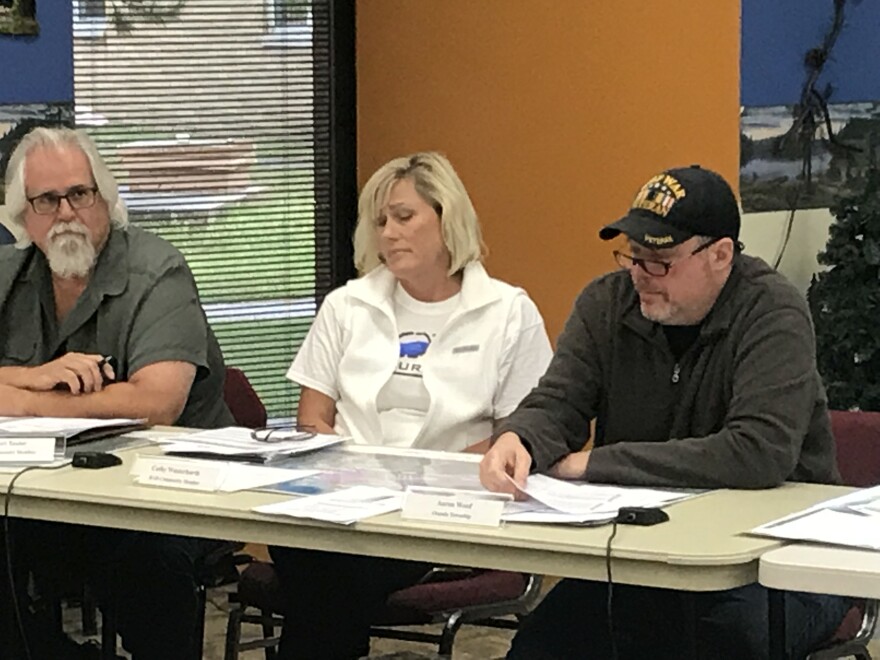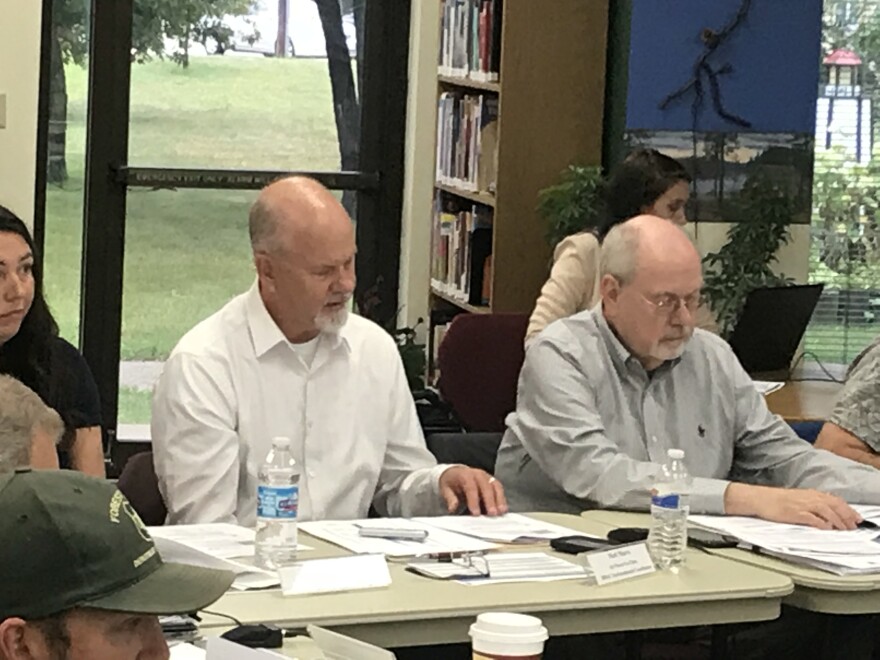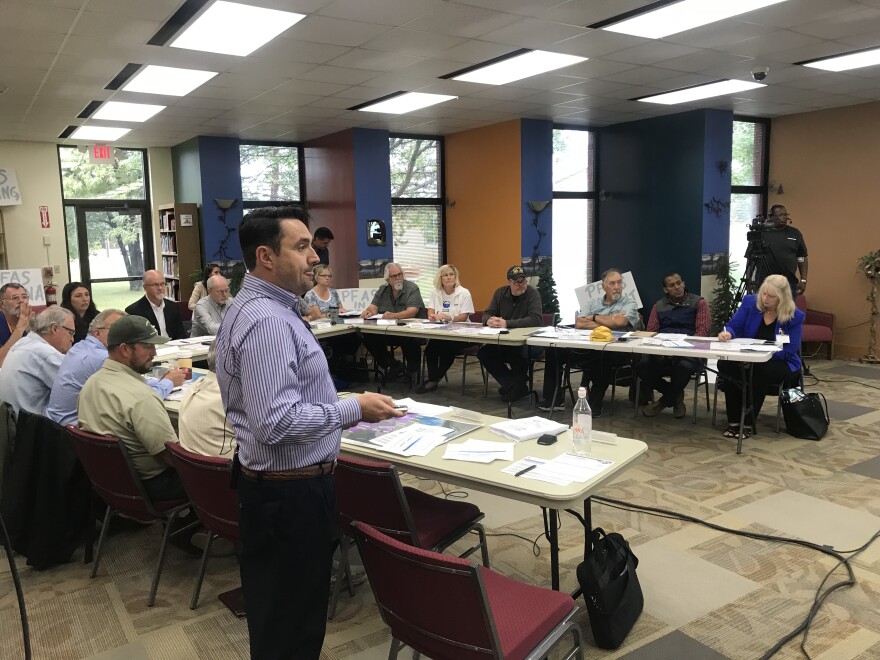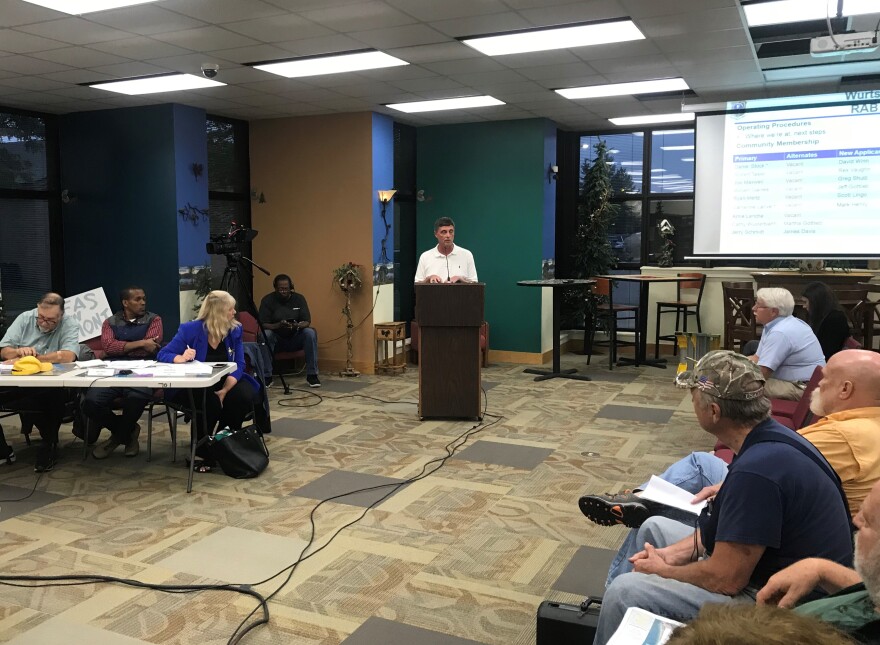At a meeting on Wednesday, Oscoda residents accused the Air Force of needlessly stalling efforts to clean up chemical contamination leaking from the former Wurtsmith Air Force Base.
Oscoda residents packed the Robert J Parks library to hear what Air Force officials had to say about ongoing cleanup efforts of PFAs coming from the former base.
PFAs, or perfluoroalkyl substances, are a family of chemicals found at sites across the state and have been linked to health problems including cancer.
The meeting began with the Air Force and state department offering updates on remediation efforts, the most recent include drinking water monitoring at 19 private wells.
Then, Cathy Wusterbarth, a member of the Need Our Water community group told Air Force members that continued delays were “unconscionable.”

“The only answers we’ve gotten from the Air Force is that further investigations need to be done,” Wusterbarth said. “But we already have the information we need. Our community is being poisoned by contaminants. The time for action is now.”
Wusterbarth pointed out that PFAs contamination leaking from the base was detected by state officials nine years ago but she said there still have not been serious remediation efforts.
At a press conference earlier in the day Wusterbarth noted that her friends and family have begun to see health impacts, including cancer, that may be linked to PFAs contamination.
Arnie Leriche, representing the community, said the state and Air Force have not adequately communicated with the community’s Restoration Advisory Board about ongoing remediation efforts. And, he said, the Air Force has not sought federal funds to do the cleanup that the community needs.
“One thing that we found out is that the Air Force is not asking for the extra congressional money that was made available by congress in the last two years. That’s not right. They should at least tell us,” he said.

Specifically, residents say they want to see the clean up of environmental contamination beyond the few drinking water wells the Air Force has worked to remediate. That would mean installing a treatment plant to address plumes of PFAs leaking from the base into surrounding areas, particularly Van Etten Lake, a public beach where PFAs foams have been found at levels as high as 165,000 parts per trillion. And, Aaron Weed, Oscoda Township Supervisor, said that he wanted the Air Force to look at more than just the federal drinking water standards.
“I have, according to federal standards, two wells that are hot. But according to medical standards I have 400 wells that are hot,” Weed said. “I need the EGLE and the Air Force to treat this as a holistic thing rather than piecemealing this.”
Part of residents' frustration built up around the Comprehensive Environmental Response, Compensation, and Liability Act (CERCLA) process, a complicated, multi-step process under the EPA which guides cleanup of contaminated sites. Air Force officials say CERCLA has to be followed. The process allows for some interim remediation efforts but requires several steps of investigation and study before determining what remediation can occur.

Jeff Moss is with AuSable Township. He said the process could take anywhere from four to six years.
“These people are sitting here because they are drinking water, they are swimming in this water, and the state and the air force is here to hear what we have to say. We’re telling you - that’s too long,” Moss said.
After the meeting, Matt Marrs, with the Air Force, said he understands residents’ frustration but the Air Force is moving as quickly as it can while following the CERCLA process. On the accusation that the Air Force hasn’t asked for the funds necessary for a full cleanup….
“Funding issues that’s above my paygrade on that but we’ve been getting a lot of funds here,” Marrs said. “So there has been a lot of money spent here and there will be a lot spent in the future.”
In particular Marrs pointed to three treatment plants that the Air Force has already funded and built in the region.
Marrs said the Air Force won’t be leaving residents behind.
“So you know it’s nice to have the number of people that come out and the interest but the Air Force has been here for close to 100 years. But we’ll still be here and still doing cleanup. It’s not like we’re leaving anytime soon.”
Tony Spaniola, who owns property in Oscoda, said the responses from the Air Force weren’t acceptable.
“We have information that’s not being shared. We have answers that are not clear. Timelines that don’t exist. Something is seriously wrong here,” Spaniola said. “The credibility of both the Air Force and to a lesser extent the state - it doesn’t exist.”
Steve Sliver is with Michigan’s PFAs action response team. He said the state’s goal is to hold the Air Force accountable. Sliver said state officials are in the process of developing enforceable maximum contaminant levels that would be lower than the current 70 parts per trillion and would allow the state to require the Air Force to increase cleanup efforts.
“If Michigan promulgates MCLs lower than 70 will the Air Force comply with them? We’ve heard the Department of Defense say yes when those are enforceable state drinking water standards and we intend to hold them to that,” Sliver said.
Aaron Weed, Oscoda Township Supervisor, said he’s not sure the state will be able to hold up its end of the bargain.
“I’m concerned about EGLE’s ability to be able to hold the Air Force accountable and for them to get it done in a timely manner,” he said.
The next meeting between the Air Force and community members is expected in December.

